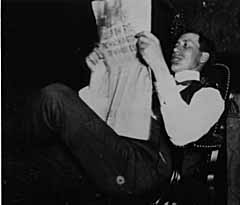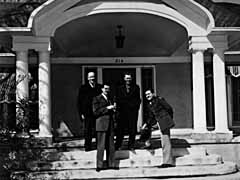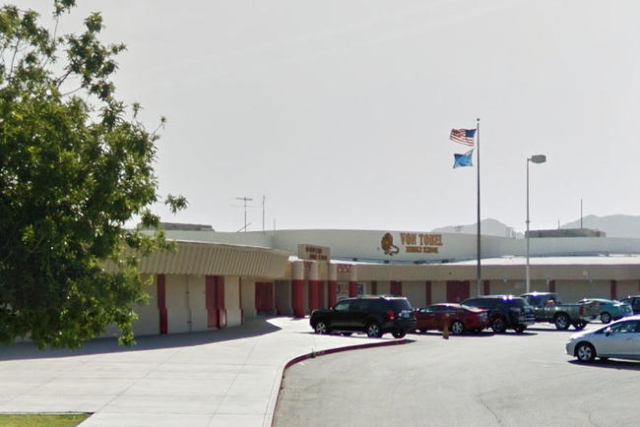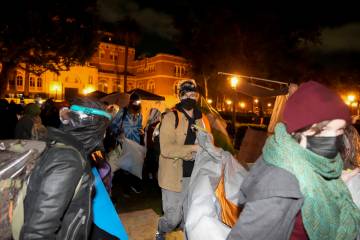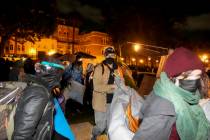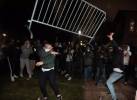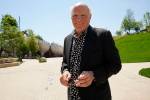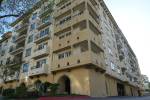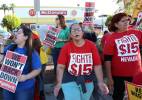Ed Von Tobel
Coming to Las Vegas was a lark for Ed Von Tobel Sr., but staying sure wasn't. The Von Tobel family hung on by its fingernails when less tenacious folk drifted away. And in more than 90 years here, they've made history in both business and politics.
The son of a Swiss immigrant, Ed was born in 1873 in Fairbury, Ill. He dropped out of high school but continued his education informally, working in his father's lumberyard, traveling in Europe, and reading newspapers voraciously. He was 20 years old in November 1903, when he sat in a St. Louis cafe with his boyhood buddy, Jake Beckley, drinking beer and reading a paper.
"It reported that the temperature in Los Angeles was 72 degrees, and it was zero in St. Louis," Von Tobel related, in a 1964 interview. "There also was an advertisement for the Santa Fe Railroad, offering a `settler's rate,' one-way to California for $30."
Von Tobel hated cold weather, and the two chums borrowed money for tickets. Ed found work in a Los Angeles lumberyard, and Jake as a barber.
But less than two years later, another newspaper ad caught their eyes, this one suggesting readers could "get in on the ground floor" when lots were auctioned in a brand new town, on the new railroad linking Los Angeles and Salt Lake City. Round-trip tickets cost only $22, and those who bought them could brag they rode the first passenger train on the line. However, with less than $100 between them, after buying their tickets, Von Tobel and Beckley didn't expect to "get in on the ground floor" -- or even a walk-up.
The young men stepped down from the car at a town consisting of one passenger railroad car, parked on a siding, equipped with a sign saying "Las Vegas." In the distance stood a tent camp, established earlier by a competing promoter, but the site of the future city was naked desert.
Beneath a big mesquite tree, on what is now North Main Street, stood a rude lumber platform, where an auctioneer and railroad officials could sit in the shade as the auction progressed. Bidders stood in the full sun as the temperature climbed to 110 -- a scorcher, even for May in Las Vegas. Men shucked coats and vests, but still sweat poured as the auctioneer's gavel rapped out the future of Las Vegas.
The only reason nobody left, Von Tobel would recall later, was the fear of missing the bargain of a lifetime. With more than 2,000 people present, choice business lots sold for $750, but who knew how long it would be till the well-heeled bidders were satisfied, and lots might go for a few dollars?
And that's what happened. On the second day of searing heat, the bidders' enthusiasm wilted. To freshen it up, the railroad announced that the round-trip fare some had paid could be deducted from a down payment, which was a fourth of the cost of a lot. Beckley and Von Tobel bought adjoining $100 lots for a cash outlay of $3 each, and a ticket stub.
The feeling of good fortune must have sustained Von Tobel until he returned to his Los Angeles job, to find he no longer had one. His employer had seen him at the land auction, and had hired a replacement.
Von Tobel hadn't until then made up his mind to move to Las Vegas, but with no other immediate prospects, borrowed money from his father to buy lumber, nails, hardware, a delivery wagon, and a team to pull it. Beckley became his partner. Surely a lumberyard would make money fast in a town being built from the ground up.
But when the partners alighted in the new settlement, seven other lumberyards were already in business. To add the final insult, one was operated by Von Tobel's former employer.
Life was like that for the next several years, relates Von Tobel's son, Ed Jr., interviewed at the age of 85 in the office he still maintains on South Maryland Parkway. His dad got some breaks, but each good fortune was followed by some blow.
"Once the town was built there wasn't enough business to keep all of them going," said Ed Jr. "My dad bought out two. It got to the point there wasn't enough business to even keep two families, so he bought out Jake, and Jake went to work for his brother Will, who had a men's clothing store."
The size of the town, perhaps 1,000 people in most of Ed Jr.'s childhood, was one reason business was poor, but another reason was the fact it was a company town. "There just weren't any new jobs being generated," said Ed Jr. "You had mainly 200 or 300 railroad workers, and they could ride to Los Angeles free to shop there, and even ship what they bought home for free if necessary. So that hurt people who sold clothing and so forth."
Von Tobel and Beckley settled into small town life with little expectation of striking it rich. At a dance, Ed met a pretty girl from Bavaria and they married in 1908. Mary Von Tobel's first son, Jake, was born in late 1909, followed by a daughter, Elizabeth, in 1911, Ed Jr. in 1913, and George Jr. in 1918.
Ed Jr. remembers life in a town where almost nobody had a lawn, but "everybody planted trees right away because they wanted the shade. Cottonwood trees were already growing at the Las Vegas Fort, so when they trimmed the limbs off, you'd grab some and stick that limb in the ground and in a couple of years you'd have a nice big shade tree. Nearly everybody did that because there was nowhere to buy other trees."
Most families managed to escape Las Vegas during the summer. Mary Von Tobel usually took the children back to Illinois, to visit Ed's parents, for about a month. Later, they rented a cabin at Mount Charleston. "We hated, it," George told a biographer in the 1990s. "There was nothing to do. ... We looked forward to going down to visit the dentist."
Las Vegans did not try to insulate children from real life. On Sunday afternoons, when the Von Tobels had guests, 9-year-old Jake was sent to buy a bucket of beer. He bought it in the closest place that had a bar, which happened to be a brothel.
Each of the Von Tobel kids worked in the family business from an early age.
Each of the boys, as he reached the age of 9 or 10, had the job of repackaging turpentine and linseed oil, which came in 50-gallon drums but was sold by the pint. "We would buy empty beer and whiskey bottles from transients for maybe a penny. We filled those, put a cork in it, and a label. We got maybe 25 cents or 50 cents a day for this, which was enough to keep you in candy." Elizabeth was still in high school when she broke in as bookkeeper.
George would steer a more independent course, running a teen-age dance band, becoming an Eagle Scout, eventually setting up his own civil engineering business, and becoming deeply involved in politics. But all four children would take part in the business as adults, and for Jake and Ed Jr., it would be the main endeavor of their lives.
Ed Sr. lived to be 94 and went to work every day until he was almost 90. He was a hands-on manager most of that time. "He used to keep his desk right behind the front counter because he wanted to see every customer who came in. He wanted to say hello."
Ed Sr. served on the first City Council and ran for the County Commission, but lost to Ed Clark, another businessman.
His son George would be the first Republican elected to the Nevada Assembly from Clark County. He served four terms. Later George was Clark County Republican chairman, and ran for Congress in 1964 and lost. His brother Jake, who died in 1993, also served in the Legislature in the 1960s.
Jake was registered as a Democrat, but all three were conservatives, particularly interested in maintaining a healthy business climate.
Ed Sr.'s efforts were personal as well as political. Prospectors knew they could hit up Ed for $100 worth of timber, on credit, to build a headframe on some hope-and-pray claim. His namesake son remembered pointing out that chances of being repaid were slim and none. Ed Sr. replied, "A hundred isn't going to make or break me. But if he strikes it rich, think what it will do for the town!"
The strike never came, but Hoover Dam would create a housing boom in the 1930s, followed by a bust. World War II brought another boom, but the Von Tobels didn't reap the profits because lumber shortages virtually shut them down.
Short supply and a downtown location less convenient for big trucks forced the Von Tobels to cater to the do-it-yourself trade and a few small contractors.
Few realized how big this trade would be. Droves of ex-GIs marrying and moving into tract houses created a huge demand for bookcases, fence posts and picture hangers and swamp coolers. Young men who had fashioned bunkers with entrenching tools and pocket knives, and who had lately whipped the Axis powers, were confident enough to build picnic tables.
The Von Tobels invented new ways to cater to this trade.
"We experimented back in the 1950s with letting people come into the hardware store and use shopping baskets and check out through a check stand, and that was the forerunner of all the Home Depot-style operations you have today," said Ed Jr.
Many adults today don't remember how great an improvement that was. "They only had so many clerks, and you had to wait your turn to ask somebody to fetch what you wanted."
Putting in a full-time checker eliminated the bottleneck. Arranging everything in aisles and labeling those aisles by content meant most people could shop without much help. "It was a great convenience to the customer, and a great convenience to us. That's why customers love it." Furthermore, because customers did much of the work themselves, it became possible to sell hardware and lumber cheaper.
Jake also experimented with the then-radical concept of letting customers walk into a building and carry out their lumber, instead of driving into a yard to load it. "He proved they would do it," said Ed. That meant the Von Tobels could keep lumber in a climate-controlled building. By making shopping more comfortable, that helped level out summer slumps in the business, which had been so pronounced in earlier years that Ed Sr. endured the occasional day without a single customer.
Since nobody else was doing business the new way, Jake had to design the self-service lumber carts. Ever wonder why today's carts carry sheets of plywood flat, instead of vertically, which would appear to be more maneuverable? It's because Las Vegas is windy, so vertical sheets caught too much air in the parking lot, tipping over carts or hurrying them eastward like lost sloops seeking Lake Mead.
In 1965 the Von Tobels built an 80,000-square-foot indoor lumberyard on Maryland Parkway near Sahara Avenue. "It was the first in the country, maybe the first in the world," said Ed Jr.
About 1976, Pay & Save Corp. out of the Northwest wanted to come to town and put in three of their stores.
Pay & Save offered Jake and Ed employment contracts, help in negotiating loans for the new stores, services to plan them, and most important, agreed to run the stores the way the Von Tobels had.
"What happened to them is something I have seen a thousand times," said Ed Jr. "It worked as long as the people who made the deal were in control. But then the next generation came along, and they had their degrees in marketing, but marketing what? Ladies nylons? They thought that it didn't make any difference what you were marketing, you did it all the same way."
Pay & Save later sold the Von Tobel stores to Ole's. Ole's was taken over by Builder's Emporium. The stores eventually were closed.
The Von Tobel family, meanwhile, had begun to concentrate on real estate interests, developing a shopping center and other commercial properties.
George was in ill health at last report, but Ed Jr., like his father, was still going to the office at the age of 85.
His father believed diversification was the way to make Las Vegas prosper. He worked hard to make it happen, and reaped the rewards. But he didn't enjoy any special insight into the future in those early years, when family after family left Las Vegas for an easier life.
"I asked my dad why they didn't pull out too, and he said, 'I had your mother and you kids here and a house here. I just had to tough it out.'
Part I: The Early Years
Part II: Resort Rising
Part III: A City In Full



